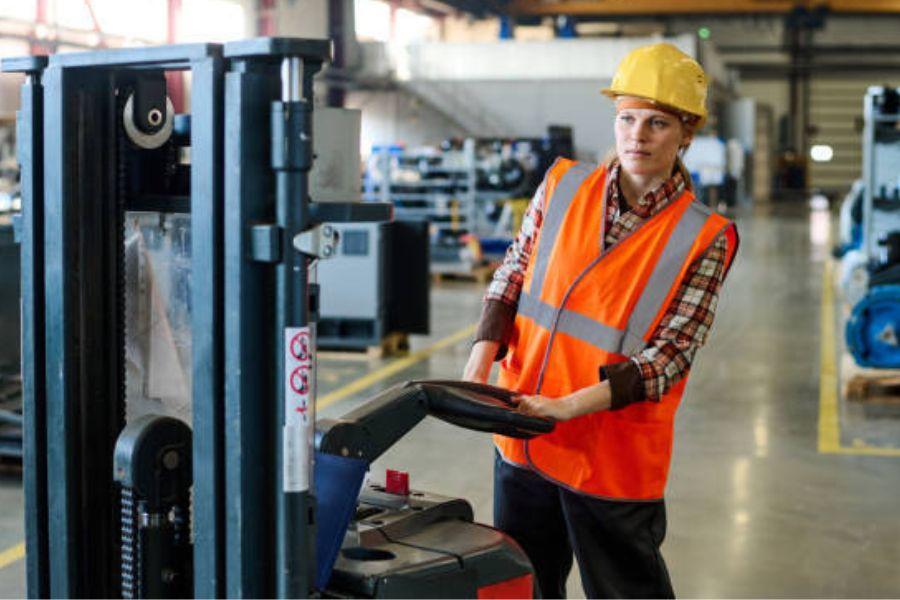COMPREHENSIVE FORKLIFT INSPECTION GUIDE | ENSURE SAFETY AND COMPLIANCE

Forklifts serve critical functions in different industries where they ease the material handling and warehousing procedures. The importance of these machines makes operators and organizations accountable for maintaining safety. Frequent forklift inspections are essential to finding anomalies, preventing accidents, and extending the life span of these machines. This debate will further examine the issues affecting how often forklift inspections should be conducted and give insight into what operators could do to improve safety protocols.
Factors Influencing Inspection Frequency
1. Usage Intensity:
The number of forklift inspections directly depends on the frequency with which the forklift is used. Forklifts that work non-stop in highly active warehouses wear out faster, requiring more frequent checkups. Order checks become a preventive action that leads to early detection of underlying problems causing outages and preventing accidents.
2. Environment:
The working environment plays a crucial role in conducting forklift inspections. The facilities may have uneven surfaces, extreme temperatures, or exposure to corrosive materials, requiring additional inspections. Changes in inspection frequency due to external conditions ensure the forklifts are well-maintained and can run through harsh environments.
3. Manufacturer Recommendations:
There are specific interval checks and routine maintenance instructions in the manuals that forklift manufacturers offer. Compliance with these recommendations matters for compliance and guarantees that forklifts operate within safe limits. Following the manufacturer's specifications maintains the equipment's functional and reliability life.
4. Regulatory Requirements:
Regulatory organizations require the frequency of forklift inspections to avoid unsafe environments and legal action. Operators should be aware of and follow these regulations to avoid prosecution. Knowing and following the rules also contributes to a safety culture in an organization.
Guidelines for Forklift Inspection Frequency
1. Daily Inspections:
Forklift operators must perform daily pre-shift inspections. This also involves checking this vehicle's fluid level, tires, brakes, lights, and other necessary parts. The daily inspections act as preventative measures for the operators, who can detect and correct risks before starting a day's work on a forklift.
2. Regular Monthly Inspections:
Apart from daily inspections, monthly checkups should be performed to thoroughly analyze the forklift's structural components, like hydraulics and safety features. Monthly checks detect wear and tear that may not be observable during routine inspections, thereby fostering early problem identification and rectification.
3. Quarterly and Semi-Annual Inspections:
Further detailed analysis of transmission, steering systems, and mast operation should be undertaken every quarter. Forklift electrical parts and controls should be subject to a detailed semi-annual analysis. Regular comprehensive inspections are needed to detect problems that may appear in due course and prevent significant breakdowns, keeping operations safe.
4. Annual Comprehensive Inspections:
Certified technicians like Bobby Park Truck and Equipment should perform a comprehensive inspection at least once a year while examining all forklift parts, including those requiring particular expertise and specialized tools. These inspections are crucial in detecting potential problems that could have longer periods of development and compliance with manufacturer specifications. Long-term safety and equipment reliability are significantly affected by annual inspections.
Conclusion:
Forklift safety is a teamwork approach involving the operators, employers, and regulatory agencies. The rate at which forklift inspections should occur should be based on the peculiarities of each work environment, including intense use needs, exposure to environmental conditions, and regulatory requirements.
A thoroughly developed systematic inspection schedule enables the operators to predict possible issues early and maintains safe, efficient forklift operations with all but minimal downtime costs. Routine inspections make the working environment safer and prolong forklifts' life span, increasing overall material handling productivity.
By setting regular inspections as a standard practice and sticking to recommended guidelines, organizations can develop an environment of security that not only shields the workforce but also ensures optimal performance and dependability in various industrial sectors.
So, if you’re looking for forklift inspection, you should choose none other than bobby park truck & equipment.
Frequently Asked Questions
When should a forklift inspection be performed?
Forklifts must undergo inspections every day according to OSHA regulations. Inspecting the machine at each operator change is necessary if it is continuously used. This usually happens at the end of each shift.
What time of day is best for the operator to check the forklift?
Before each use and at the start of each shift, the operator is responsible for thoroughly inspecting the forklift.
Forklift inspections should be conducted by whom?
Every day, before the operator starts their shift, forklifts must be inspected by OSHA requirements. Before putting the forklift into action, the operator must thoroughly check and notify their supervisor of any irregularities.
WHY CHOOSE US?
- Full Parts and Service Shop
- State of the Art Paint Shop
- Body Work
- Van bodies, reefer bodies, Flatbed bodies and Storage Containers available
- Tuscaloosa and Jackson Locations
- Ships anywhere in the United States

